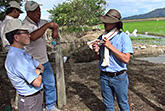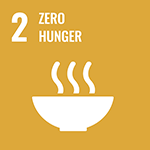Development and Adoption of Latin American Low-input Rice Production System Through Genetic Improvement and Advanced Field-management Technologies
Principal Investigator


Dr.
Senior Scientist, Agrobiodiversity Research Area, International Center for Tropical Agriculture (CIAT)
Manabu Ishitani
ODA Recipient Country
Republic of Colombia
Research Institutions in Japan
The University of Tokyo / Kyushu University / Tokyo University of Agriculture and Technology / National Agriculture and Food Research Organization (NARO)
Research Institutions in Counterpart Country
International Center for Tropical Agriculture (CIAT), National Federation of Rice Growers (FEDEARROZ) , etc.
Adoption fiscal year
FY 2013
Research Period
5 Years
Overview of the Research Project
Developing resource-efficient field management technologies and new-generation rice varieties for underdeveloped irrigation infrastructure in Colombia
Rice is produced in inefficient irrigation systems in many areas in tropical Latin America, and the efficiency of water and fertilizer utilization is generally low compared to that of Asia. Weed control is also problematic due to the heterogeneity of water depths, which further aggravates the excessive use of herbicides and the decline in productivity. Through this project we utilize deep-rooting genes to develop new Colombian rice varieties that can attain higher yield with lower inputs of water and nutrients. We also adopt precision agriculture approaches with state-of-the-art sensing technologies, and thus address the challenge of developing and adopting new low-input technologies for Latin American rice production.
Efforts in Colombia can contribute to global food security
Progress in the research conducted by this project can boost rice production in Colombia, with the country potentially attaining self-sufficiency in rice. It may lead to a higher employment rate and the steady growth of local agricultural communities, and enable in-country refugees to return to their villages. If other Latin American countries, and perhaps even African countries, were to adopt these new rice cultivars and low-input technologies, the research would contribute to food security on a global scale.
Photo gallery
Research Project Web site
Press Release
Links
Projects
Contact Us
Japan Science and Technology Agency (JST)
Department of International Affairs
SATREPS Group
TEL : +81-3-5214-8085
Related articles by Category
- Bioresources
Bioresources
 Republic of Uganda
Republic of Uganda
Development and Promotion of Sustainable Perennial Rice Production System Using Multiple Crop Harvesting Technologies
- Colombia
Bioresources

 Republic of Colombia
Republic of Colombia
Enabling sustainable beef production by eliciting the power of cattle and grasslands on a digital platform!
Creation of Beef Value Chain by Optimizing Ruminal Microbiota and Grassland Management on Digital Platform
- Latin America
Disaster Prevention and Mitigation

 Republic of El Salvador
Republic of El Salvador
Protecting international port cities from compound disasters with dominostyle chains of destruction!
Compound Disaster Risk Reduction associated with Large Earthquakes and Tsunamis
- SDGs : Goal.2
Bioresources
 Solomon Islands
Solomon Islands
Implementation of a Comprehensive Sweet Potato Seedling Management System for National Food Security



















